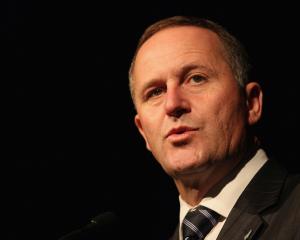Winston Peters has this afternoon gone public with his knowledge of what was in the controversial tea tape.
Prime Minister John Key complained to police after his conversation with Act candidate John Banks in Epsom on Friday was recorded by a freelance cameraman.
Mr Key has since refused to discuss what was on the tape, and police today announced they'd be executing search warrants at four media outlets for any material they might have related to it.
But about 1.30pm today, New Zealand First leader Winston Peters announced he'd reveal the contents of the tape at a public meeting in Invercargill.
He's said the tape canvassed issues including the future and leadership of the Act party, New Zealand First's electoral chances and the percentage of the vote National would secure.
In rolling coverage by 3News of Mr Peters' meeting, he's reported to have said: "If you sat down in a café or restaurant and there was a black pouch on the table what would you do? Of course you would take it to the counter - that is what decent people do.
But Key and Banks did not do that simple act for one reason," Mr Peters said.
"They were enchanted. They were enchanted with each other - and the bit of political theatre they had contrived. Contrived with a capital C!"
3News reported Mr Peters felt this would be an embarrassment for the Prime Minister.
"John Key has been found wanting. And the New Zealand electorate has been warned in time to take the action at the ballot box."
• Four media outlets are to be searched for any material they might have in their possession that relates to the tea pot tapes.
Radio New Zealand has confirmed it's one of them, reporting it has been told by police to hand over any unpublished news material it has relating to the tea pot tapes.
TVNZ has also confirmed it will be searched.
The Prime Minister John Key laid a complaint with police after his conversation with Act party candidate John Key in Epsom on Friday was recorded by a freelance cameraman.
The cameraman gave the tape to the Herald on Sunday, which reported the fact the conversation was recorded - but not the content of the tape.
TV3 has also said it has a copy of the tape, but has not aired it.
Police say 'about four' other media organisations will be served with a search warrant.
TVNZ's One News political editor Guyon Espiner reported on the broadcaster's Midday programme had been told to expect a search warrant.
Herald on Sunday Editor Bryce Johns says he has had no approach from police this week.
Radio New Zealand's head of news, Don Rood, says the organisation is refusing to hand over any material gathered by news staff to police.
Police have told him that they will get a search warrant and execute it today or tomorrow.
The broadcaster's Checkpoint programme ran an interview with Bradley Ambrose, the cameraman who made the recording.
Earlier, Mr Key underlined his determination not to buckle to pressure and release the so-called teapot tape by yesterday twice walking out on journalists in the face of questions.
In what may be a major test of his political judgment, Mr Key appeared prepared to dig in his heels and stand firm on his position _ a tactic that could inflame the issue with only nine days until the election and New Zealand First on the rise in the polls.
His political opponents called the walkout of a press conference unprecedented and damaging to Mr Key's credibility, and increasing speculation that the pair's conversation included derogatory comments about Act leader Don Brash and the elderly who support NZ First.
Mr Key yesterday became defensive and called the issue a "sideshow''. He claimed that media interest in the story did not square with the public's interest in other election issues including the economy.
After a walkabout in Upper Hutt with National's Rimutaka candidate Jonathan Fletcher, Mr Key answered a handful of questions on the teapot tape before ignoring further ones and jumping into his limo.
Earlier in the day, he dramatically walked out of a press conference after side-stepping questions about the tape, saying each time that he wanted to focus on issues such as the economy.
The teapot story and video of the press conference were the most popular items on the Herald website yesterday, and the story is a hot topic on social networking sites.
NZ First leader Winston Peters continued to hint at derogatory comments he claims to know were caught on the tape.
"Dumping on your publicly announced coalition partner's leadership is serious,'' Mr Peters said. "Dumping on old people who have done so much for this country in their younger days, in trying times, is serious.''
In a speech in Whangarei yesterday, Mr Peters mocked the PM's claim that he could not recall discussing NZ First supporters or elderly people with Mr Banks.
Labour leader Phil Goff said Mr Key's tactic was a window into his credibility, and the public had a right to know if the pair had discussed the future of Dr Brash's leadership.
"Be honest with the electorate beforehand what they're trying to do, not afterwards. For a Prime Minister to storm out of a press conference is unprecedented, I think, in my time in politics.
"I can't remember a Prime Minister going back to Muldoon that was so brittle they couldn't take the heat of answering valid questions from the news media. That's his job.''
Mr Key said consenting to the release of the tape would jeopardise his ability to "get out there and meet people all of the time. I would have to be on the lookout for [covert recording devices] every second.''
He has suggested that giving his consent to publish the tape could lead to tragedy.
"What happens if a couple of high profile New Zealanders have a conversation about their son or their daughter being suicidal _ a Sunday paper reports that and that child takes their own life?''
But the Media Freedom Committee _ which represents mainstream media organisations _ condemned the comparison yesterday.
"To suggest this case could lead to much wider publication of private conversations, even raising the subject of suicide, was unfortunate and totally wrong,'' secretary Tim Pankhurst said.
He said the matter could be resolved if Mr Key or Mr Banks consented to publishing the contents of the tape "to let voters be the judge of its importance''.
- Derek Cheng and Paul Harper, New Zealand Herald




